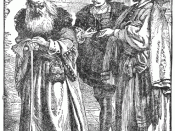The Merchant of Venice is a versatile play which can be interpreted in many ways. Antonio is the merchant of Venice and he is presented as the hero at the beginning of the comedy because he is a good Christian trying to help out a friend. Another merchant is Shylock, he is Jewish and he is presented as the villain. Through the character of Shylock Shakespeare attempts to explore many issues of indifference, justice, accountability and social discrimination. However, as the plot gradually becomes intense it becomes harder and harder to distinguish who is the antagonist and who is the protagonist.
Shakespeare chose Venice as a setting, in order to understand the play we must closely look at the setting. Venice is a famous cultural city in Italy, in the Renaissance period it was a crossroad for crusaders, a money-lending centre of Europe, the mercantile, tumultuous city. This vivid setting of Shakespeare fascinated the Elizabethans, as it was commercially hospitable to people from all parts of the world, for instance Greeks, Jews and Protestants.
Venice itself was Catholic city and politically independent. A place of great beauty, luxury and it was extremely artistic. The city was also a trading centre of great importance, a marketplace of commerce. Therefore, we can relate the theme of exchange with commerce, because commerce means exchanging money. In the play which is called as Merchant of Venice there are many incidents of exchange; exchange of love, exchange of money, exchange of religion and so on. For this reason, in this paper, William Shakespeare's play called The Merchant of Venice will be analyzed through the theme of exchange and how these incidents of exchange affect the lives of the people?
In the beginning of the play we come across with the first incident of exchange, Bassanio,


